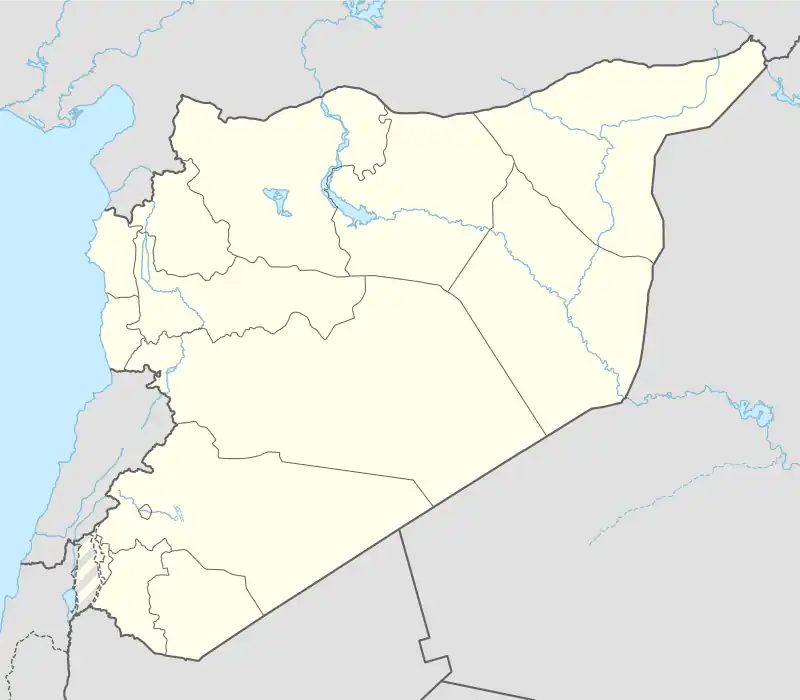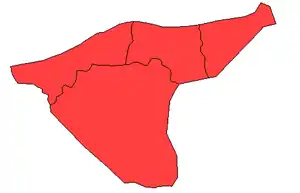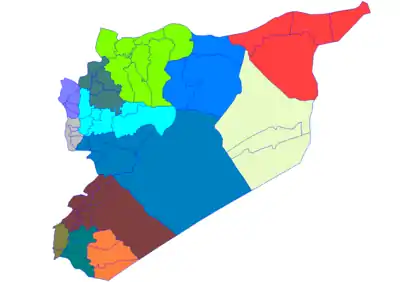Al-Qahtaniyah
ٱلْقَحْطَانِيَّة Tirbespî ܩܒܪ̈ܐ ܚܘܪ̈ܐ | |
|---|---|
Town | |
 Al-Qahtaniyah Location of Al-Qahtaniyah in Syria | |
| Coordinates: 37°02′07″N 41°37′26″E / 37.035375°N 41.623917°E | |
| Country | |
| Governorate | al-Hasakah |
| District | Qamishli |
| Subdistrict | al-Qahtaniyah |
| Control | |
| Elevation | 405 m (1,329 ft) |
| Population (2004)[1] | 16,946 |
| Time zone | UTC+2 (EET) |
| • Summer (DST) | UTC+3 (EEST) |
| Geocode | C4751 |
Al-Qahtaniyah (Arabic: ٱلْقَحْطَانِيَّة, romanized: al-Qaḥṭānīyah; Kurdish: Tirbespî; Syriac: ܩܒܪ̈ܐ ܚܘܪ̈ܐ, romanized: Qabre Ḥewore), formerly Qubur al-Bid, is a town in northeastern Al-Hasakah Governorate, northeastern Syria. It is the administrative center of al-Qahtaniyah Subdistrict, which consists of 103 localities. Historically an Assyrian city,[2] at the 2004 census, it had a population of 16,946.[1]
Etymology
Al-Qahtaniyah was officially called Qbor el-Bid until 1962. Its old name was derived from the Arabic words "Qbor" ("graves") and "el-Bid" ("white") – i.e. "white graves."[2]
Demographics
The majority of the towns inhabitants are Kurds, followed by a large number of Assyrians and Arameans.[2]
Churches in the town
- Syriac Orthodox Church of Our Lady (كنيسة السيدة العذراء للسريان الأرثوذكس)
History
In 1927, the Kurdish tribal chief Haco Agha of the influential Haverkan tribe immigrated from Turkey together with more than 600 families and settled in the town.[3] On 13 March 2004, after the 2004 Qamishli riots when 40 Kurdish civilians were killed, residents of Al-Qahtaniyah who protested the killings were shot at and injured by Syrian forces.[4]
As of 2004, Al-Qahtaniyah is the sixth largest town in Al-Hasakah governorate.
In late July 2012, during the civil war, the YPG took control of the town.[5]
Notable people
- Ciwan Haco (1957*), Kurdish singer
- Muhammad Khayr Ramdan Yusef
See also
References
- 1 2 "2004 Census Data for Nahiya al-Qahtaniyah" (in Arabic). Syrian Central Bureau of Statistics. Archived from the original on 10 October 2017. Retrieved 15 October 2015. Also available in English: UN OCHA. "2004 Census Data". Humanitarian Data Exchange. Archived from the original on 2015-12-08. Retrieved 4 December 2015.
- 1 2 3 "Four thousand olive trees planted in Tirbespiyê". Firat News Agency. 2020-05-04. Retrieved 2021-02-20.
- ↑ Fevret, Maurice; Gibert, André (1953). "La Djezireh syrienne et son réveil économique". Revue de géographie de Lyon (in French) (28): 1–15. Retrieved 2012-03-29.
- ↑ "Report by the Special Rapporteur on Torture and Other Cruel, Inhuman, or Degrading Treatment or Punishment, Theo van Boven Syrian Arab Republic". Retrieved 17 November 2012.
- ↑ "Tyrkisk avis: Kurdistan nr. 2 bliver dannet". Jiyan (in Danish). 22 July 2012. Archived from the original on 28 July 2013. Retrieved 17 November 2012.


